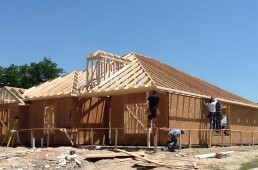
January 9, 2015 | by Katie Claflin
Categories: Affordable Housing, Construction, First Time Buyer, Homeownership
Last year was a frustrating year for many entry-level home buyers hoping to purchase a home in Texas. Why was the Texas housing market unkind to entry-level buyers in 2014?
A recent study released by the Federal Reserve Bank of Dallas offers an explanation.
As housing demand increased over the past few years, the availability of moderately-priced homes began to dry up. For example, the number of existing homes priced under $200,000 has decreased dramatically in the past four years, from almost 70% of the market in 2010 to 56% of the market in 2014. Homes that were once priced under $200,000 are now priced much higher, squeezing many entry-level buyers out of the market. Citing data from the Texas A&M Real Estate Center, the Dallas Fed argues this phenomenon particularly affected buyers in the Austin, Dallas and Houston markets.
Additionally, developers have been slow to build entry-level housing, instead focusing on more expensive homes. This is for two reasons: 1) entry-level home buyers have had more difficulty qualifying for mortgages, and 2) it is easier to recoup building costs with a more expensive product.
Although 2014 was a tough market for entry-level buyers, there is hope on the horizon. Effective Dec. 1, 2014, new guidelines from Fannie Mae and Freddie Mac have eased lending standards to help more low and moderate-income buyers qualify for mortgages. As a result of the additional demand created by these entry-level buyers, the Dallas Fed predicts that overall housing demand will increase in 2015, which should motivate builders to resume building moderately-priced homes.
As housing options increase for first-time and other entry-level buyers, home buyer assistance programs like TSAHC’s become even more important to ensure these buyers can achieve their dreams of homeownership.
On the House blog posts are meant to provide general information on various housing-related issues, research and programs. We are not liable for any errors or inaccuracies in the information provided by blog sources. Furthermore, this blog is not legal advice and should not be used as a substitute for legal advice from a licensed professional attorney.
TSAHC reviews all blog comments before they are posted to ensure a positive experience for our online community. Off-topic comments; hostile, derogatory or deliberately insulting comments; and comments specifically promoting goods and services will not be posted.
Approved comments will be published in their entirety. Personal information will not be removed unless it pertains to someone other than the person submitting the comment. For more information, please see our Comment Posting Guidelines.
To remove a previously submitted and published comment, please contact Anna Orendain at [email protected].
If you have a question regarding any of TSAHC's programs, please contact us.
